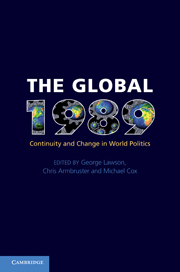Book contents
- Frontmatter
- Contents
- List of figures
- List of tables
- Notes on contributors
- Acknowledgements
- List of abbreviations
- Introduction: the ‘what’, ‘when’ and ‘where’ of the global 1989
- Part I What and when
- Part II Where
- Part III Continuity and change
- 9 One bright moment in an age of war, genocide and terror? On the revolutions of 1989
- 10 A dangerous utopia: the military revolution from the Cold War to the war on terror
- 11 From Berlin to Baghdad: learning the ‘wrong’ lessons from the collapse of communism
- Conclusion: was there a global 1989?
- Bibliography
- Index
9 - One bright moment in an age of war, genocide and terror? On the revolutions of 1989
Published online by Cambridge University Press: 05 June 2012
- Frontmatter
- Contents
- List of figures
- List of tables
- Notes on contributors
- Acknowledgements
- List of abbreviations
- Introduction: the ‘what’, ‘when’ and ‘where’ of the global 1989
- Part I What and when
- Part II Where
- Part III Continuity and change
- 9 One bright moment in an age of war, genocide and terror? On the revolutions of 1989
- 10 A dangerous utopia: the military revolution from the Cold War to the war on terror
- 11 From Berlin to Baghdad: learning the ‘wrong’ lessons from the collapse of communism
- Conclusion: was there a global 1989?
- Bibliography
- Index
Summary
Introduction
Public attention did not stay with the revolutions of 1989 for very long. The peaceful revolutions in Eastern Europe were followed by war in the Gulf and, soon after, the Balkans. While participants and observers alike experienced 1989 as an ‘annus mirabilis’, the return of genocide and ethnic cleansing in Europe, and then the wider world, prompted a re-examination of the darker aspects of twentieth-century European and world history. Scholarly interpreters spoke of an age of extremes, and identified Europe as a dark continent marred by war, terror and genocide. Even democracy itself was not immune from critique, coming under fire for its ‘dark side’ and, most notably, the fusion of demos and ethnos that was seen to generate bouts of ethnic cleansing (Hobsbawm 1994; Mazower 1998; Mann 2005).
After 1989, it seemed as if the legacy of the Cold War and the age of extremes was yet more war, terror and genocide. There is palpable uneasiness about the current and future shape of world politics, not least in how the ‘war on terror’ can lead to a suspension of democracy and human rights, and the return of militarised economies and imperialist politics. As antidotes to these dark visions, scholars have begun to reappraise twentieth-century history, focusing on its brighter moments (Winter 2006; Judt 2008). In these more optimistic narratives, achievements like the declaration and extension of human rights around the world, the redistributive successes of welfare states and the emancipation of women take centre stage.
- Type
- Chapter
- Information
- The Global 1989Continuity and Change in World Politics, pp. 201 - 218Publisher: Cambridge University PressPrint publication year: 2010



